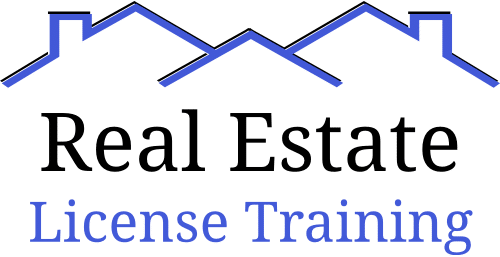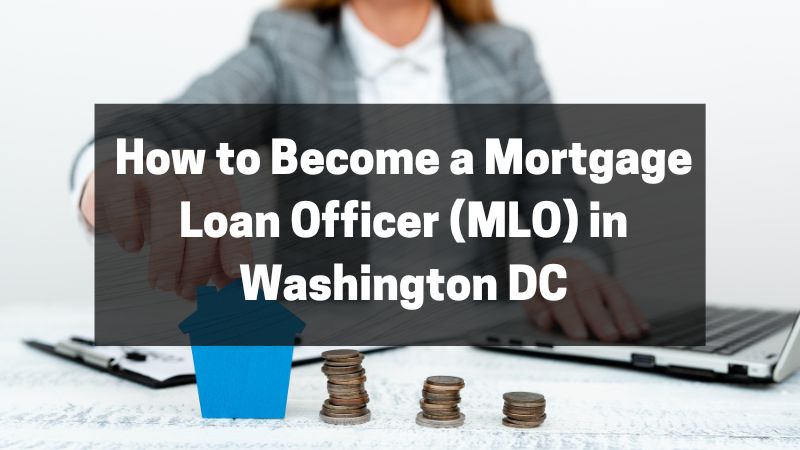Becoming a mortgage loan officer (or originator) may sound a bit daunting.
This is especially true if you have no idea where to begin.
But don’t worry — we’re here to give you all the requirements specific to Washington DC.
We’ll walk you through the steps — from start to finish.
What’s more, we’ll even answer some FAQs about MLOs in the district.
There’s a lot to cover, so let’s dive right in!
The 7 Steps on How to Become an MLO in Washington DC
To become a licensed mortgage loan officer in Washington DC, you need to complete these 7 steps:
- Ensure your eligibility
- Create an account in NMLS
- Complete the education requirements
- Pass the license test
- Start your MLO license application
- Undergo a Criminal Background Check
- Request company sponsorship
Let’s explore each one further.
Step #1: Ensure Your Eligibility
It might not seem like it, but there are only a few requirements to qualify for a mortgage loan originator license.
You don’t even need a college degree, although that will greatly help you find employment. The same goes for having work experience in the finance industry.
You only need two things to be eligible for an MLO license in Washington DC. These are:
- You must be at least 18 years old
- You have a high school diploma or its equivalent (a GED)
Yes, that’s it.
Step #2: Create an Account in NMLS
Once you know you’re eligible, the first thing to do is to create an account in NMLS.
Click here to request an account.
The National Mortgage Licensing System (NMLS) is a centralized database for all professionals in the mortgage industry. Once you have an account, you’ll have a unique ID — this becomes your license number for your entire MLO career.
As you work on your MLO license, you’ll need to complete forms and upload the necessary documents. You’ll do all that through NMLS.
Step #3: Complete the Education Requirements
Although you don’t need a college degree to become a mortgage loan officer, it doesn’t mean you won’t need to fulfill any education requirements.
To build your knowledge about the laws and procedures surrounding the mortgage industry, you must complete a pre-licensing course.
In Washington DC, that means going through 20 hours of pre-licensure education (PE). These consist of the following:
- Non-Traditional Mortgage Lending – 2 hours
- Federal Law – 3 hours
- Ethics – 3 hours
- General Electives – 9 hours or more
- D.C Mortgage Lending Laws and Regulations – 3 hours
The great news is that there’s no lack of DC-approved real estate schools where you can get the required PE. Some are even online, which can be convenient for those with hectic schedules.
Here are just a few approved online schools you can check out:
Step #4: Pass the Licence Test
It’s time to put your knowledge to the test.
All DC MLO license applicants must take the SAFE MLO Test.
Prometric administers the test.
You can choose to take it online or in person.
However, before scheduling it, you must pay the fee through NMLS and accept the Candidate Agreement.
To do that, simply Login to your NMLS account > Go to the Test & Education tab > Fill up the test details > Add the test window to your cart > Go to the invoice and pay the $110 fee > Accept the Candidate Agreements > Schedule your SAFE MLO Test with Prometric.
Now, prepare to go through 120 items, all of which are multiple-choice questions. Prometric gives you 190 minutes to complete the exam.
The passing score is 75%.
As a guide, NMLS provides a test outline to give you an idea of the exam’s coverage. Don’t forget to study the MLO Testing Handbook too.
Step #5: Start Your MLO License Application
To apply for your DC MLO license, you’ll need to submit Individual Form MU4 in the NMLS.
To begin the process, log in to your NMLS account and follow these steps:
- Go to Filing > Individual > Request/New Update.
- Provide the following details:
- The state (or district) where you want to be licensed
- The type of license you’re applying for (Mortgage loan officer or originator)
- Identifying information
- Other names (only those you’ve used after turning 18)
- Residential history
- Employment or school history
- Other businesses you may be involved with (if applicable)
- Answer the disclosure questions.
| NOTE: If you answer ‘Yes’ to any question, you must provide the detailed context or document in the Disclosure Explanation section. |
- Request a Criminal Background Check. You can either ‘Use Existing Prints’ or ‘Submit New Prints’. More on this in the next step.
- Authorize a Credit Report check. You do this by switching on the Completeness Check icon at the top right corner AND completing the identity verification process.
- Click the submit filing button and pay the required fees:
NMLS initial processing fee – $30
DC application fee – $300
Criminal Background Check fee – $36.26
Credit Report fee – $15
TOTAL FEE – $381.25
Step #6: Undergo a Criminal Background Check
If you chose ‘Use Existing Prints’ for your Criminal Background Check, that means you already have fingerprints on file that the NMLS can use.
However, if you don’t, then you’ll need to tick on the ‘Submit New Prints’.
And for that, you’ll need to schedule a fingerprinting appointment with the NMLS Fieldprint.
Note that you’ll have to create an account before scheduling.
Once your fingerprints are taken, they will be submitted to the NMLS for checking.
If you experience any challenges, don’t hesitate to call Fieldprint at (888) 472-8918 OR (877) 614-4361.
Step #7: Request Company Sponsorship
To be able to practice as a mortgage loan officer in Washington DC, you need to have a sponsorship.
If you’re already working for a mortgage company, simply have them request sponsorship for you.
If not, then you have to go out and find employment with a DC-licensed mortgage lender, mortgage broker, or mortgage dual authority licensee.
As we said, a college degree (more specifically a Bachelor’s degree in finance, accounting, or business) will boost your resume. Not to mention some work experience in the industry.
Once you’re employed, let your employer request sponsorship for you.
The District of Columbia Department of Insurance, Securities, and Banking (DISB) will review the request and either accept or decline it.
If accepted, then you can work as a mortgage loan officer in Washington DC. Just note that they don’t issue paper licenses.
If declined, you can contact the DC DISB with this number (202) 727-8000 or email them at bankingbureau@dc.gov.
And that’s it!
That is how to become a mortgage loan officer (MLO) in Washington DC.
It wasn’t too complicated, right?
Frequently Asked Questions About Mortgage Loan Officers in Washington DC
How Much is a Mortgage Loan Officer License in Washington DC?
You’ll need to pay a total of $891.25 to get an MLO license in Washington DC.
Here is the cost breakdown:
- $300-$500 for the pre-licensure education
- $110 for the SAFE MLO test
- $30 for the NMLS initial processing fee
- $300 for the DC application fee
- $15 to request a credit report
- $36.25 for the Criminal Background Check
Aside from your pre-licensure cost, everything else is paid through the NMLS platform.
How Much Do Mortgage Loan Officers Make in Washington, DC?
According to Salary.com, the average salary of an MLO in DC is $71,631 per year (as of July 2023). This can reach lows of $61,869 to highs of $84,375.
On the other hand, Indeed.com puts the average MLO base salary in DC at $146,783 (as of July 2023). The lowest salary is around $65,550 and the highest is at $328,685 per year.
Of course, your salary will depend on many factors, including company, workload, experience, location, and so much more.
How Hard is the SAFE MLO Test?
Over half of first-time test takers (55%) pass the SAFE MLO test on their first try.
You can increase your chances of joining them by taking an exam prep course. Some online real estate schools include it in their pre-licensure education package.
What Can I Expect from the SAFE MLO Test?
The MLO license test covers 5 areas. The estimated breakdown of questions is detailed below:
- 11% are on Uniform State Content
- 18% are on Ethics
- 20% are on General Mortgage Knowledge
- 24% are on Federal Mortgage-Related Laws
- 27% are on Mortgage Loan Origination Activities
Conclusion
So now you know how to become a mortgage loan officer (MLO) in Washington DC.
What are you waiting for?
It’s very easy to get started!
All you need to do is check if you’re eligible and create an account with NMLS.
From there, you can follow the steps and requirements detailed here.
Best of luck!

